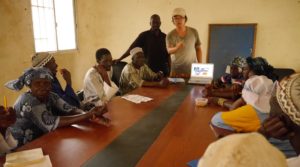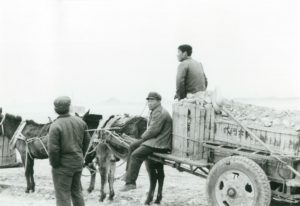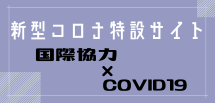『International Development Journal』2018 June edition
In November 2017, the Cabinet Secretariat Administrative Reform Promotion Headquarters carried out “administrative review” for each ministry and agency with the aim of reducing the wasteful spending of the government budget, among which a drastic system reform of “JICA volunteer projects” was requested. Concurrently, as JICA’s budget crunch became serious at the same time, people are concerned that the budget would be scaled down considerably.
Sudden Drastic Reform Request
Administrative business review is held twice a year, every spring and autumn. In FY 2017, the Japan Overseas Cooperation Volunteers (JOCV) Project became an agenda in the spring review.In the spring review, discussions were mainly focused on how to increase the number of recruiters, including promotion of recruitment of cooperating volunteers and support for career paths after returning home. Some problems such as the evaluation method of JOCV activities were pointed out, but overall positive evaluation was done.However, in the autumn review, a drastic review of the system was requested and changed. Particularly, among the “incumbent participation schemes” that JICA can participate in the Cooperation Volunteers program while enrolled in the workplace, “JICA will bear the personnel expenses for the affiliation during the leave of absence” personnel expenses compensation system “was suddenly picked up for review. In response to this, JICA considered with the Ministry of Foreign Affairs and the Ministry of Finance and decided to drastically review the cost compensation system from 2018, announcing that it will abolish the system from spring recruitment of the same year on March 15.
Many officials are confused about the sudden review. “As long as we use taxes, it is natural that we reform the system according to changes in social situations, taking into consideration the essential parts such as the ideals and objectives of this project.”
This autumn review is directly linked to the budget decision of the Ministry of Finance the following year, and immediately before that, JICA’s budget execution is fuelling the “JICA funds problem”. In addition to the emergence of the issue, there is concern that this project will shrink significantly.
Are “Personnel Expenses” Necessary?
“Personnel expenses compensation system” was developed in 1973 to ensure the return of workers after coming home.
JICA supplements 80% of salary and bonuses to members belonging to companies and organizations in Japan with registered employees on leave of absence. In addition, private companies are supplemented with 40% of salaries and bonuses added as general administrative expenses.
Lifetime employment was common at the beginning of this system, so the members were concerned about reinstatement after returning home. Therefore, with this system that can participate without quitting work, I was able to urge more citizens to participate.
However, the lifetime employment system is changing now, including reform of workers. In anticipation of the downsizing of the Japanese market accompanying the declining population, companies must also secure global human resources in order to proactively expand into new overseas markets such as emerging countries. That is why, “It is easy to reinstate a person with experience in cooperation without having to bother paying the personnel expenses”. This is the reason why the system reform was requested in the review.
However, this sudden abolition could lose confidence in the Cooperation Volunteers project that we have built up with companies. Especially for small and medium enterprises, it is difficult to bear the human costs such as social security for two years, leaving the participation of the participants in the company. If there is not any supplement, it may not be possible for companies to gain approval in the future.
On the other hand, Minister for Foreign Affairs Mitaka Okamoto, Member of the House of Representatives, said, “Japanese society has changed since more than 50 years ago when the Cooperation Volunteers started, as it is a public utility that uses taxes, It is important to reform the system. ” Meanwhile, “It is not appropriate to suddenly set zero compensation for personnel expenses, and we should carefully” fix “the system so that the system change will not be detrimental to those who wish to participate.”
Also, Mika Yamamoto, Secretary General of the Japan Overseas Cooperation Volunteer, JICA, the executing agency of the project said, “What was regarded as an issue in the review was supplementing salaries and bonuses even in the personnel expenses compensation system. Unlike treatment, it can be said that “salary” is occurring, so the evaluator may well point this out. I will take it seriously as a critical point of view from the public’s perspective, and I will deal with it seriously. “
Meanwhile, the “In-service participation system is also highly necessary from the viewpoint of social return after returning home. It is an important system. Social security expenses that are burdensome to companies as they leave their affiliation will be supplemented as necessary expenses. ” It seems that JICA is currently discussing the concrete contents of institutional change.
Questioning the Introduction of Quantitative Evaluation
In the review, besides the personnel expenses compensation system, it is requested to review the “qualification for volunteer selection”, “how to evaluate the project”, “distinction between JOCV and senior volunteers”, and “cooperation with NGOs”.
Among them, objections are also raised by stakeholders on the policy of introducing a quantitative evaluation method to the volunteer project. As far as the JOCV project uses taxes of the people, implementation of project evaluation is natural, but members will be dispatched to countries that can make use of their experiences and skills in the same position regardless of age, sex and career. Since each of them is doing activities that were consistent with their daily lengths, it would not be reasonable to quantitatively evaluate the activities of individual crew members, as long as they are evaluated for the entire project.
From the time of establishment, the JOCV project has consistently been “contributing to the development and reconstruction of the economy and society of developing countries”, “deepening mutual understanding and coexistence in cross-cultural society”, “social return making the most of volunteer experience” It is aiming at three pillars. All three of these are JOCV projects and the points on the project evaluation method in the autumn review are “contribution to development and reconstruction to developing countries”, that is, the two-year activities at the dispatch destination of cooperating volunteers.
On the other hand, Director Yamamoto said, “We will never rank volunteers by quantitative evaluation, but I would like members to learn and use the PDCA cycle evaluation method to make their activities more fulfilling, JICA will evaluate the entire project based on the evaluation of the activities of the men and will fulfill the accountability to the people, and I will promote the establishment of such evaluation system. “
Establishment of the evaluation system is a problem that Yamamoto was chiefly addressing from the time he was appointed director. “In particular,” mutual understanding in cross-cultural society “for business purposes has a diplomatic aspect, and” individual social return after returning home “is done by experienced persons outside the framework of ODA. For this reason, it can not be measured by JICA’s other evaluation method of ODA projects. I will do my utmost to devise a unique evaluation system suitable for this project. “
Okamoto, a parliamentary official also said, “It is important to consider the purpose and the means which are important to the implementation of the policy. Attainment of the purpose of the three pillars of this project is the most important. We must undertake reform. “
In addition, the Youth Overseas Cooperation Volunteers (20-39 years old) and senior volunteers (40-69 years) separated by age will also review the system contents considerably from the fall recruitment in FY 2006. “We will not unify the age category and integrate them, but we will review them together,” Yamamoto said.
Refocus on the results of 50 years
As a citizen-participating ODA project, the Cooperation Volunteer Project, which is in its 53rd year this year, has achieved tremendous results.
Okamoto, a parliamentary official, also visited many countries where cooperation troops were dispatched and said that he was keenly aware of the significance of this project. “The biggest reason why leaders in each country appreciate Japan is the cooperation team, they live together with the residents in the local community, volunteer on the residents’ perspective, and pass the baton to the next generation. I am improving the lives of the residents over time. The long-term activities are highly appreciated, and the significance of diplomacy is immeasurable, “he said.
The JOCV business is undergoing a turning point now. It is left to concrete reforms to be carried out by the autumn of this year whether to be reborn into a better system for members, families and workplaces supporting them, people in dispatched countries, and for all Japanese citizens. The mission of reform is great how to pass the baton connected for half a century to the next generation.
Planning Department/Director : Nobuyuki Tanaka
***** 以下、日本語原文 *****
JICAボランティア事業の価値を見つめ直す—改革か縮小か揺れ動く青年海外協力隊
2017年11月、政府予算の無駄づかい削減を目的に内閣官房行政改革推進本部が各省庁を対象に実施する「行政事業レビュー」が開かれた。その中で「JICAボランティア事業」の大幅な制度改革が要請された。折しも、同時期にJICAの予算ひっ迫が明らかとなったこともあって、関係者からは「予算が大幅に縮小されるのではないか」と不安視する声が上がっている。
突然の抜本的な改革要請
「行政事業レビュー」は毎年、春秋の2回、行われる。17年度は、春にも協力隊事業が議題になった。春のレビューでは、協力隊員の募集広報や帰国後隊員の進路支援など、募集人数をどう増やすのかを中心に議論された。協力隊活動の評価方法など一部課題が指摘されたが、全体としては前向きな評価がされた。
しかし、秋のレビューでは一転して、制度の抜本的な見直しが求められた。特に、職場に在籍したまま協力隊事業に参加できる「現職参加制度」のうち、JICAが、休職期間中の所属先への人件費を負担する「人件費補てん制度」が、秋の段階で突如取り上げられ、見直しが求められた。これを受けてJICAは、外務省・財務省と検討を行い、18年度より人件費補てん制の抜本的な見直しを決定。3月15日付で同年度春募集から制度を廃止すると発表した。
突然の見直し決定に戸惑う関係者は多い。「税金を使う以上、社会情勢の変化に合わせて制度を改革するのは当然だが、この事業の理念や目的など本質的な部分を踏まえた上で、議論が尽くされたようには見えない」との指摘もある。
この秋のレビューは、翌年の財務省の予算決定に直結しているほか、その直前には、JICAの予算執行が焦げ付く「JICA資金問題」の浮上も相まって、この事業の大幅な縮小が懸念されているのだ。
「人件費補てん」は必要か
「人件費補てん制度」は、隊員の帰国後の職場復帰を確保すべく、1973年に整備された。
日本での所属先企業や団体に有給休職の扱いで籍を残しながら参加する隊員が対象で、その給料・賞与の8割をJICAが所属先に補てんする。加えて、民間企業については、一般管理費分として、給与・賞与の4割を上乗せして補てんするものだ。
この制度開始当時は、終身雇用が一般的だったため、隊員にとって帰国後の復職への不安が大きかった。そこで、仕事を辞めずに参加できるこの制度で、より多くの国民の参加を促すことができた。
しかし、現在、働き方改革をはじめ、終身雇用制度も変わりつつある。企業も人口減少に伴う日本市場の縮小を見据え、新興国など新たな海外市場に積極進出していくには、グローバル人材の確保が不可欠だ。だからこそ、「わざわざ人件費を補填せずとも、協力隊経験者の復職は容易になっている」というのが、レビューで制度改革が要請された理由だ。
ではあるが、今回の突然の廃止は、今まで企業との間で築きあげた協力隊事業への信頼を失いかねない。特に中小企業などでは、参加者の籍を会社に残して2年もの間、社会保障など人的コストを負担するのは難しくなる。何らかの補てんがなければ、今後、企業の賛同が得られなくなるのではないか。
これに対し、外務大臣政務官の岡本三成・衆議院議員は「日本社会は、協力隊事業が始まった50年以上前に比べて様変わりしている。税金を使う公共事業である以上、変化に合わせて制度をより良い形に改革することは重要だ」と語った。その一方、「人件費補てんを急にゼロにするのは妥当でない。制度変更が参加希望者の不利益にならないよう、慎重に制度の「修正」を図るべきだ」と話した。
また、事業の実施機関であるJICAの山本美香・青年海外協力隊事務局長は「レビューで課題とされたのは、人件費補てん制度の中でも給与や賞与の補てんだ。これは他のボランティア隊員の待遇と異なり、「給与」が発生しているとも言えるため、評価者の指摘もごもっともだ。国民目線に立った重要な指摘と受け止め、真摯に対応していきたい」と話す。
一方、「現職参加制度は、帰国後の社会還元の観点からも必要性は高く、重要な制度だ。所属先に籍を残す上で企業に負担がかかる社会保障費は、必要経費として補てんすべきではないか」と述べた。JICAは現在、制度改変の具体的な中身を議論しているようだ。
定量評価の導入に疑問の声
レビューでは、人件費補てん制度以外にも「ボランティア選考における応募資格」、「事業の評価方法」、「青年海外協力隊とシニアボランティアの区別」、「NGOとの連携」などの見直しが要請されている。
中でも、ボランティア事業に定量的な評価方法を導入する方針にも関係者から異論が出ている。協力隊事業は国民の税金を使う以上、事業評価の実施は当然だが、隊員は年齢、性別、キャリアに関係なく、みな同じ立場で経験やスキルを生かせる国に派遣される。各自が身の丈にあった活動をしているため、この事業全体への評価ならまだしも、個々の隊員の活動を定量的に評価するのは妥当と言えないのではないか。
秋のレビューでの事業評価方法に関しての指摘は「開発途上国への発展・復興への寄与」の部分、つまり協力隊員の派遣先における2年間の活動だけについて言及している。事業全体を俯瞰した議論ではなく、十分とは言えないだろう。
これに対し、山本局長は「定量評価で隊員を順位付けすることはない。ただ、隊員には、PDCAサイクルの評価手法を学んで活用し、活動をより充実したものにして欲しい。そうした個々の隊員の活動評価を踏まえてJICAがこの事業全体を評価し、国民への説明責任を果たしていく。そうした評価体系の確立を進める」と話す。
評価体系の確立は、山本局長が局長就任時から問題意識を持って取り組んできた課題だ。「特に、事業目的の「異文化社会における相互理解」は外交的側面があり、「帰国後の社会還元」に関しては隊員経験者の個人が行うことであり、どちらもODAの枠組み外のことである。このため、JICAが行う他のODA事業の評価手法では決して測れるものではない。この事業に適した独自の評価体系の策定に全力で取り組んでいきたい」と語る。
岡本政務官も「政策の実行に重要なのは目的と手段をしっかり分けて考えることであり、事業評価はあくまで手段だ。この事業の3本柱の目的達成が最重要で、これらを担保しながら改革していかなければならない」。
また、年齢で分けられている青年海外協力隊(20~39歳)とシニアボランティア(40~69歳)も、18年度の秋募集から制度内容を大きく見直す予定だ。「年齢区分を取り払って一本化するわけでなく、両者を一体的に見直していく」と山本局長は話した。
50年の成果を見つめ直す
国民参加型のODA事業として、今年で53年目を迎える協力隊事業は、多大な成果を上げている。
岡本政務官も協力隊が派遣されている多くの国を訪れ、この事業の意義を痛感したという。「各国のリーダーが日本を高く評価している最大の理由は、協力隊だ。彼らが現地のコミュニティで住民と共に暮らし、住民目線でボランティア活動を行う。そして、そのバトンを次の世代に繋ぐことで、時間をかけて住民の生活を改善している。こうした長きにわたる活動が高く評価されており、外交上の意義は計り知れない」と熱く語った。
協力隊事業は今、転機を迎えている。隊員はもちろん、彼らを支える家族や職場、派遣国の人々、そして日本国民全員にとってより良い制度に生まれ変わるかどうか、今秋までに実施される具体的な改革に委ねられている。半世紀も繋いたバトンを次の世代にどう繋いでいくか、改革の使命は大きい。
本誌企画部長:田中信行






